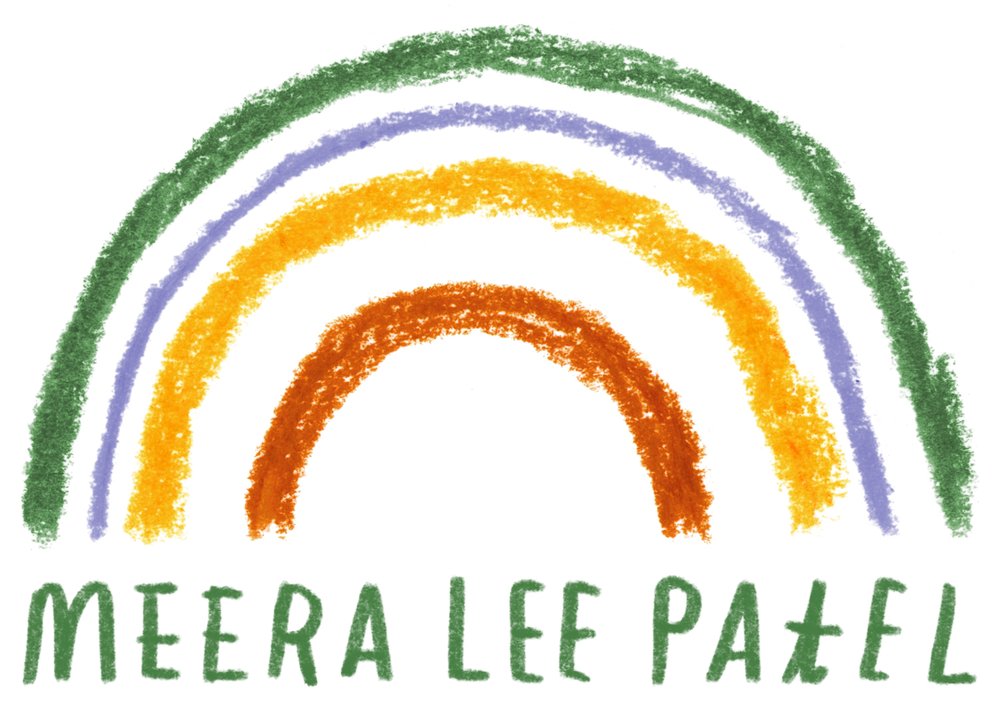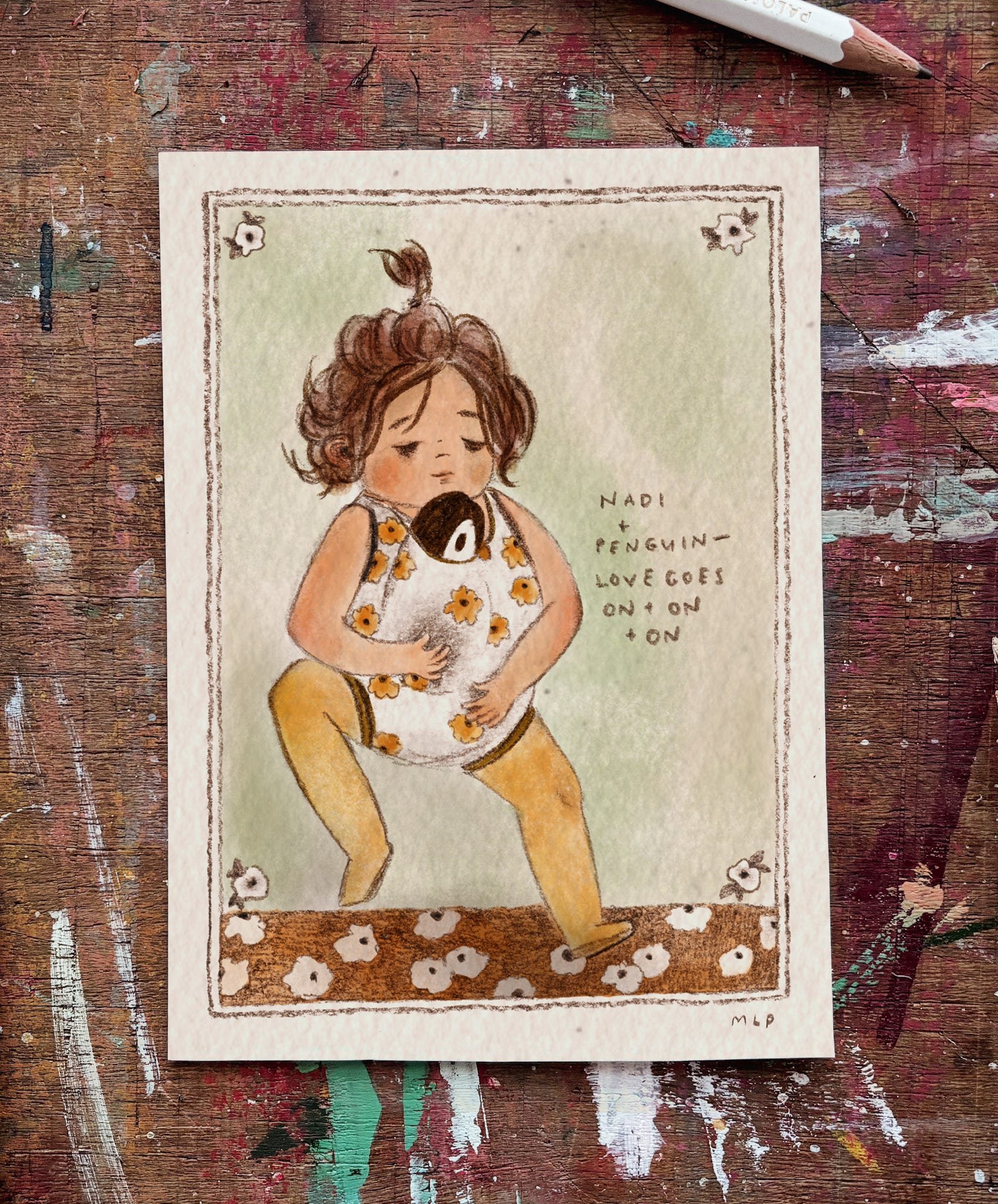N and Penguin — love goes on and on and on (pencil on paper, 2024)
A year from now, here are five things from this week that I'd like to remember:
MONDAY
Over the weekend, we drove to a farm in Illinois to find our way through an 8-acre corn maze. We did, and then we piled back into the car and drove home to have lunch. After F’s nap, we walked to the library and chose new books, stopping at the playground to practice the monkey bars. We hurried home to make dinner and it was halfway through, while shoveling chicken and rice into her mouth, that N told us that she couldn’t find Penguin anywhere.
Penguin, or Pen-Pen, is N’s lovey, who has slept in her arms each night since she was born. He eats meals with her regularly, both at our home and in public. He gets his own seat and sometimes, he gets his own meal. He’s taken baths with her, made wishes with her, traveled across state lines and open seas with her, and it is he that she calls for when most upset or unconsolable. N’s love for Pen is so great that it inspired F’s love for Tunafish, an absolutely identical penguin that N gifted her only so F would stop thieving Pen from her room.
T goes to check the car and the garage, and when no Penguin is found, he gets on his bike and rides through the neighborhood. He retraces the path we took to the library and the playground, searches the alleyways, checks the slides. I email the library, already closed, and ask them to please look for Penguin. I call the farm, which is still open, and the manager tells me she’ll check the lost and found. If I leave my name and number, she’ll call me when he turns up. Her voice is sweet and understanding. All of us at the farm—we’re all mothers, she tells me. We know what this is like. We’ll find him.
For the first time in her almost-four years of life, N goes to bed without her penguin. I miss Pen, she says. What if we never find him? Breaking my own rule, I lie with her until she falls asleep. I wonder where Pen-Pen is. It’s a big world for such a small, sweet penguin.
Afterwards, I search the house and play the tape back in my mind. I rewind it over and over, stopping at all the same moments, pressing play. Did F bring him to the farm thinking he was Tuna? Did I put him in my bag when we got there? Did he fall under the picnic table? Did he fall out when I opened the car door? I saw him in the car—didn’t I? Didn’t I?
In the morning, N makes the shape of a penguin with her arms. Mom, last night when I didn’t have penguin, I closed my eyes and it felt like I was holding him. I am grateful for her brilliant imagination, for its ability to comfort her. I am disappointed that memory—as shoddy and unreliable as it is, with all its faulty limitations—is still the next best thing to the actual presence of something we love.
T tells us he’s going to work and then drives back to the farm. He runs the entire 8-acre corn maze again, retracing our steps through the playground and the farm field stores. He searches the grassy field, now beginning to fill with the morning rush of cars and giggling children. Not here, he texts me. The heart breaks.
I think of somebody—anybody, who wouldn’t know how much our family has cared for this little penguin—and how they’d find and toss him, casually, into the trash. The heart breaks.
Things become family because we care for them, because we choose to divest our finite energy away from one avenue and pour it into another. N loved Penguin into our family, caring for him as we care for her. She considered his feelings, as I do for her. I loved him because she did.
N finds the first drawing I did of her and Penguin. It’s the invitation from her first birthday party. She tucks it into a tote bag and says she’ll show everyone in the neighborhood his picture, so they can call us when they find him. So they can return him to his family. She retraces the steps T already retraced, carrying the invitation like a missing-child milk carton in her hands. When we don’t see him, she asks me again: Mom, what if we never find him?
I tell her I don’t know if we’ll find him or not, but that it’s up to us to keep looking, to keep believing that we will. Missing somebody is hard. It’s a difficult thing to feel, the love a too-big-something squashed inside our hearts, but what it tells us is good: that we care.
More than the missing, it’s the not knowing that causes ache. Penguin’s absence is unexpected—after hundreds of near-losses, I took for granted that he’d always eventually turn up again. We’ve saved him from airplanes and cousin’s houses, bathtubs and alleyways. I didn’t think he’d ever actually disappear.
I know that Penguin is a stuffed animal. I know there isn’t any substantial value to him other than the love that he symbolized for a child and her family. I know his story is every child’s story, or every child’s worst fear. I know N will be fine. But it’s a big world for such a small, sweet child—and the heart still breaks in ways I didn’t know it could.
TUESDAY
“Real isn't how you are made,' said the Skin Horse. 'It's a thing that happens to you. When a child loves you for a long, long time, not just to play with, but REALLY loves you, then you become Real.'
'Does it hurt?' asked the Rabbit.
'Sometimes,' said the Skin Horse, for he was always truthful. 'When you are Real you don't mind being hurt.'
'Does it happen all at once, like being wound up,' he asked, 'or bit by bit?'
'It doesn't happen all at once,' said the Skin Horse. 'You become. It takes a long time. That's why it doesn't happen often to people who break easily, or have sharp edges, or who have to be carefully kept. Generally, by the time you are Real, most of your hair has been loved off, and your eyes drop out and you get loose in the joints and very shabby. But these things don't matter at all, because once you are Real you can't be ugly, except to people who don't understand.”
—from Margery Williams’ The Velveteen Rabbit
WEDNESDAY
It’s been an unexpectedly good week for mail:
I received a beautiful copy of Mai and the Missing Melon by Sonoko Sakai, illustrated by my old friend Keiko Brodeur. This sweet story explores the relationship between a young girl and her grandmother, the Japanse folktale of The Stone Buddhas, and Japanese food, culture, and history. In the package, Keiko also included a generous selection of gorgeous new cards from her sweet stationery company, Small Adventure.
I received my copy of FAIL-A-BRATION by my friends Brad and Kristi Montague, which celebrates failure. I’m not sure a better (or more necessary) celebration can be had.
also runs a really heartfelt and encouraging newsletter called The Enthusiast which I always look forward to reading.
After gifting my professor a copy of Tolkien’s The Father Christmas Letters, I ordered one for myself and it arrived today. I am taken by this collection of letters, written and illustrated by Tolkien (as Father Christmas) to his children over the span of 23 years. The letters eventually inspired parts of The Lord of the Rings, which is really exciting. It reminds me to play—to remember that the art we create for fun can lead us to our most challenging and fulfilling projects. Reading through the letters, what strikes me most is how vast a person’s imagination can be—and how untapped most of ours are.
THURSDAY
Color study of N and Penguin (2024)
A small color study of N and Penguin. I’m trying hard to capture the feeling of such a classic childhood relationship—a child and her stuffy—with colors and washes that withstand the test of time.
I keep asking myself what makes a good picture, or a good sentence—it’s ability to speak to anyone, regardless of age or experience? I don’t know; I’ll keep asking.
FRIDAY
If I were to live my life
in catfish forms
in scaffolds of skin and whiskers
at the bottom of a pond
and you were to come by
one evening
when the moon was shining
down into my dark home
and stand there at the edge
of my affection
and think, “It’s beautiful
here by this pond. I wish
somebody loved me,”
I’d love you and be your catfish
friend and drive such lonely
thoughts from your mind
and suddenly you would be
at peace,
and ask yourself, “I wonder
if there are any catfish
in this pond? It seems like
a perfect place for them.”
—Your Catfish Friend by Richard Brautigan
xx,
M





